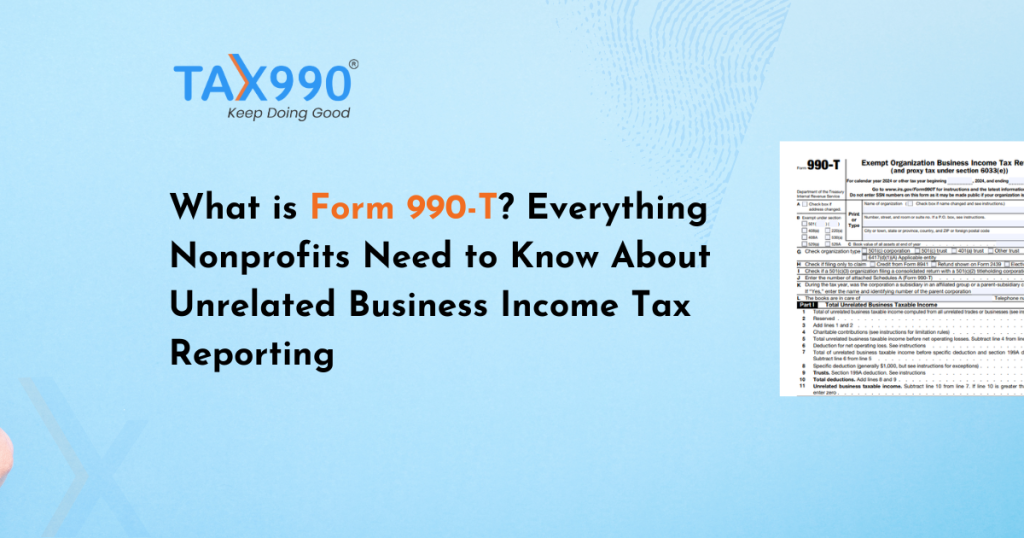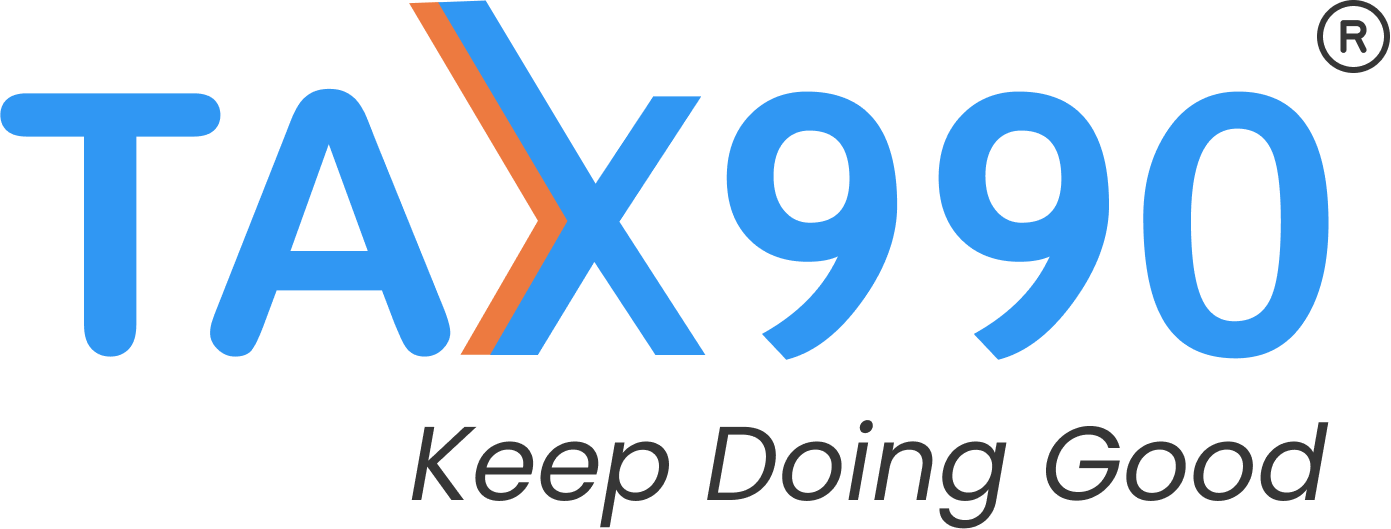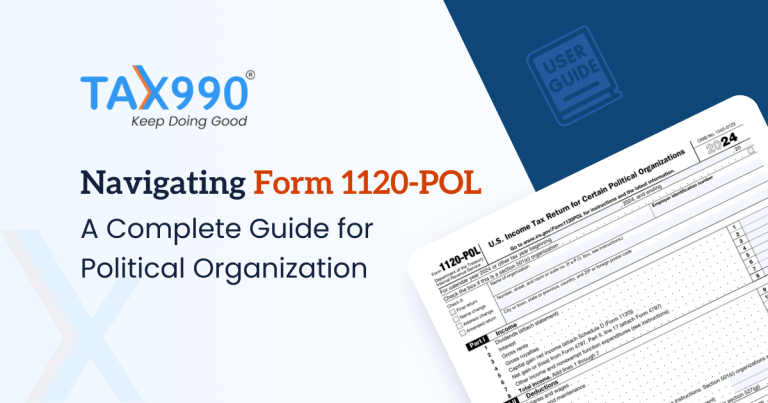What is Form 990-T? Everything Nonprofits Need to Know About Unrelated Business Income Tax Reporting
Estimated reading time: 19 minute(s)

You’re doing incredible work—whether it’s helping your community, providing vital services, or championing a cause you care about. And as a nonprofit, you’re fortunate to enjoy exemption from federal income tax as long as your focus remains on advancing your mission. But what happens when your organization starts bringing in income from activities that don’t directly relate to your mission?
That’s where Unrelated Business Income Tax (UBIT) comes in. When your nonprofit engages in income-generating activities that are not tied to your exempt purpose—especially if they are ongoing and resemble a for-profit business—you could be subject to UBIT. Whether it’s hosting a charity auction or renting out office space, if these ventures operate like a traditional business, UBIT could be in play.
But don’t worry—it’s all about being compliant and understanding the rules. UBIT isn’t something to fear, but it’s important to understand when it applies and how to handle it. To stay on top of things, you’ll need to report this income using Form 990-T.
In this blog, we’ll explain exactly what UBIT is, how it impacts your organization, and how to file Form 990-T correctly so you can stay compliant and focus on what you do best—serving your mission.
What is Unrelated Business Income Tax (UBIT)?
Unrelated Business Income Tax (UBIT) is a tax that applies when a nonprofit earns income from business activities that are unrelated to its core mission. While nonprofits are generally exempt from federal income tax, UBIT ensures that income from non-exempt business activities is taxed similarly to how a for-profit business would be taxed.
So, how do you know if an activity is unrelated and subject to UBIT? For it to qualify, all three of these conditions must be met:
- It is a trade or business – The activity involves selling goods or services to generate income.
- It is carried out regularly – The activity is conducted frequently or continuously, similar to how a for-profit business would operate.
- It is not substantially related to the organization’s tax-exempt purpose – The activity doesn’t meaningfully contribute to the charitable, educational, or other mission for which the organization received tax-exempt status.
If your nonprofit’s activities meet all these criteria, they may be subject to UBIT, and you’ll need to report that income to the IRS on Form 990-T.
Reporting UBIT on Form 990-T
If your nonprofit organization files a 990 series return—like Form 990, 990-EZ, or 990-PF—and earns $1,000 or more from activities that are not related to your mission (called unrelated business income or UBI), then the IRS requires you to file Form 990-T.
- Report Unrelated Business Income (UBI) generated from activities unrelated to your nonprofit’s exempt purpose.
- Calculate and report the Unrelated Business Income Tax (UBIT) that may be owed.
- Report additional tax liabilities, such as proxy tax on certain political expenditures.
- Claim refunds for taxes paid by certain investment funds like RICs or REITs on long-term capital gains.
- Request credits for federal excise taxes or small employer health insurance premiums.
- Report UBIT on reinsurance entities, if applicable to your organization.
Schedule A: Additional Filing Requirement for 990-T
When filing Form 990-T, you’ll need to pay close attention to 990 -T Schedule A. This schedule is where you can determine whether your nonprofit is eligible for any specific exemptions or deductions related to your Unrelated Business Income (UBI).
Schedule A allows you to:
- Claim deductions for expenses tied to unrelated business activities. For example, if you operate a store or advertise your business, you can deduct those expenses to reduce your taxable UBI.
- Report exemptions for certain types of income that may not be subject to UBIT. This includes income from activities like research or rental income related to your nonprofit’s mission.
The purpose of Schedule A is simple: it ensures you’re not paying taxes on income that directly supports your mission. It helps you exclude income that’s mission-related and offsets any taxable UBI with eligible expenses. By completing this schedule, you can minimize your UBIT liability and focus on what matters most—advancing your cause.
Due Date for Filing Form 990-T
When filing Form 990-T, the due date depends on the type of organization submitting the form. The IRS has set specific deadlines based on the organization’s structure and the type of income it receives. Let’s break down these deadlines and how they apply according to the IRS guidelines.
1. Trusts for Employees’ Benefits (Section 401(a) Organizations)
For employees’ trusts defined under Section 401(a), IRAs (Individual Retirement Accounts), Roth IRAs, Coverdell Education Savings Accounts (ESAs), and Archer MSAs (Medical Savings Accounts), the deadline for filing Form 990-T is the 15th day of the 4th month after the end of the tax year. For calendar-year filers, this means the form is due April 15th.
This deadline is important for organizations that are administering employee benefit programs or retirement savings vehicles that generate unrelated business income (UBI), which is taxable.
2. Other Organizations
For other organizations that are not classified under the above categories, the filing deadline for Form 990-T is the 15th day of the 5th month after the end of the tax year. For calendar-year filers, the due date is May 15th.
This would apply to a variety of nonprofit organizations that may generate unrelated business income (UBI), such as certain charitable organizations or foundations that are not specifically covered under the trust categories mentioned above.
Penalties for Form 990-T
Failing to file Form 990-T or pay any taxes owed on time can lead to some serious penalties. Here’s what you need to keep in mind:
- Late Filing Penalty: The IRS charges 5% of the unpaid tax per month, up to 25%. If the form is filed more than 60 days late, the minimum penalty is the lesser of the tax due or $510.
- Late Payment Penalty: This penalty is 0.5% of the unpaid tax per month, up to 25%.
It’s clear—timing is crucial. So, ensure you file on time to avoid these costly penalties.
Request an Extension to File Form 990-T
If your nonprofit needs more time to file Form 990-T for reporting Unrelated Business Income Tax (UBIT), you can request an automatic 6-month extension by filing Form 8868 (Application for Extension of Time To File an Exempt Organization Return) with the IRS. This gives you extra time to prepare your return without facing late filing penalties.
Focus on Your Mission: 990-T Filing Made Easy with Tax990.
Filing Form 990-T is essential for nonprofits that generate income from activities unrelated to their core mission. Understanding what qualifies as unrelated business income and staying compliant with IRS rules helps you avoid penalties and maintain your tax-exempt status.
With Tax990, your organization can confidently meet the 990-T filing requirements and continue focusing on its mission. We offer a seamless way to file Form 990-T and all the necessary schedules to make this process easier.
Ready to start your 990-T e-filing process? Get started with Tax990 today by creating your free account!




Leave a Comment